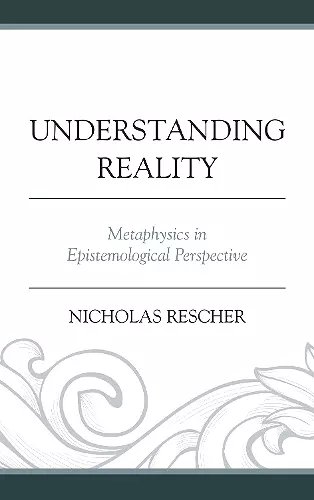Understanding Reality
Metaphysics in Epistemological Perspective
Format:Hardback
Publisher:Lexington Books
Published:15th Aug '18
Currently unavailable, and unfortunately no date known when it will be back

The book sees to show that the present discussion so unfolds as to show that ultimately Reality’s inherent impetus to lawful order serves also to account for its existence. The ultimate explanation of its order is as something that also provides for its reason for being. Step by step, a train of thought unfolds to indicate that Reality both exists and has the nature it does for good reason, and specifically because this is somehow for the best. Such an approach goes back to the Platonism of classical antiquity. Many difficulties lie in the way of its acceptance. But is it, in the final analysis, the theory that works here takes the form of a Neo-Platonism of sorts. Or if reality has any rational explanation at all, it is one that will have to proceed along these lines, based upon rationality itself. An underlying theme that runs throughout the present elaboration of metaphysics is the dialectic of interaction between descriptive facts on the one hand and normative ideals on the other. On such a view, it is a salient factor in metaphysics that reality as such is descriptively constituted as a potentially perfect system of knowledge even though we imperfect beings cannot get a more than an imperfectly secure cognitive grip on it. Accordingly, we can never hope to surmount the contrast between: • The metaphysical ideal of a perfected system of knowledge. • The imperfect realization of actuality that we can ever hope to achieve in practice.
Rescher's Understanding Reality is wide-ranging, expert and impressive. His main verdict is particularly interesting: What makes the world intelligible, he concludes, is that its existence “is somehow for the best”, as Plato and Leibniz suggested. -- John Leslie, Fellow of the Royal Society of Canada
The breadth of Understanding Reality: Metaphysics in Epistemological Perspective matches that of its title, and very few philosophers could even approach its combination of subtlety and readability. Nicholas Rescher’s treatment of control is an impressive example—it ranges from important points in action theory to what he aptly calls “the ethics of control,” which concerns how control of conduct figures in our moral responsibility for it. The discussions of simplicity, uncertainty, understanding, and other topics are also illuminating. This book has numerous insights, and it will reward not only readers in metaphysics and epistemology but also those interested in a wide but nicely nuanced treatment of topics in the philosophy of science. -- Robert Audi, John A. O'Brien Professor of Philosophy, University of Notre Dame
ISBN: 9781498585101
Dimensions: 228mm x 161mm x 23mm
Weight: 508g
222 pages